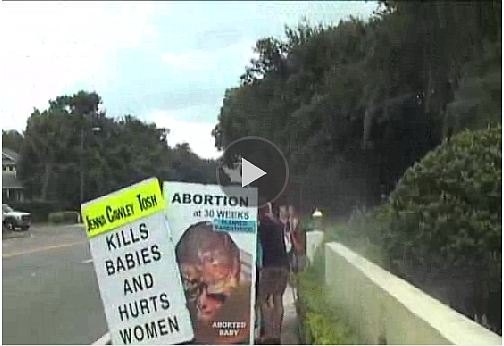- April 22, 2024
-
-
Loading

Loading

Winter Park is one vote away from banning protests in neighborhoods forever, as the City Commission gave preliminary approval on Monday to make an “emergency public safety ordinance” permanent.
The ordinance, which would ban anyone from protesting within 50 feet of a residential home in the city, comes after anti-abortion protestors picketed the home of a notable resident on Aug. 18.
“I literally had to push through these folks who were carrying massive protest signs and signs that said, ‘Jenna Tosh kills babies and hurts women,’” Planned Parenthood of Greater Orlando CEO Jenna Tosh said at the Aug. 27 Commission meeting. The head of the women’s health care provider is also the sister-in-law of “Tosh.0” show host and University of Central Florida alumnus Daniel Tosh.
That night the Commission passed an emergency 60-day ordinance banning protesting in residential areas. On Monday, Sept. 10, the Commission voted to make that ordinance permanent.
The 4-1 vote, which was opposed on the Commission by Mayor Ken Bradley, grabbed the interest of a local constitutional lawyer, who said the city went “way too far” to stop anyone from protesting within 50 feet of a residential home in the city. Attorney and UCF political science instructor Derek Brett said the ordinance would ban protesting in “huge swaths of the city,” referring to it as “unconstitutionally overbroad.”
On Monday night, the mayor denounced the protest at the Tosh home as “heinous.” But though the protest in question involved signs depicting aborted fetuses, Bradley said that he couldn’t stomach voting to make protesting illegal.
“I understand the need to have some sort of public safety… but I just can’t get around our Constitution on this matter,” Bradley said. “I just can’t vote to stop free speech.”
The remaining four members of the Commission disagreed, stating that the city’s need for public safety trumped its need to allow protests. The ordinance will require a second vote before it officially becomes law. That could occur as soon as Sept. 24.
Commissioner Steven Leary said that though he did so begrudgingly, he would have to vote in favor of the law.
“I hate that we have to do this,” Leary said. “I hate that our friends or neighbors or guests would have to feel fearful in their homes or any other place. Just for me, protecting our residents and their children, and if they have fear of walking out of their door, that’s a tough call. No one should live in fear of that.”
Other Commissioners reacted likewise, saying that they thought that personal safety trumped free speech, citing Tosh’s account that she felt “threatened and ambushed” by the group of 30 protestors outside her home.
But Winter Park resident Paul Vonder Heide said there is no added danger from protestors because there are already laws in the city to protect residents if they’re in danger.
“Laws that prohibit rioting, assault, noise and trespass for example,” Vonder Heide said. Those laws, he said, would be enforced on site by the same police officers who would now be dispatched to stop protests before any of the existing laws were broken.
Vonder Heide pointed to the interesting timing of the city recently honoring civil rights leader Martin Luther King Jr. before curtailing speech rights in the city.
“You put a sign up in a public park to honor a civil rights leader, yet your ordinance mocks his life dedicated to peaceful protest as the most effective weapon against a racist and unjust society,” he said.
What the courts say
City Attorney Larry Brown said that the ordinance should stand up in court, citing a similar case, Frisby v. Schultz, decided by the U.S. Supreme Court in 1988.
“When I dug into these laws, they stated that protecting residential tranquility was a paramount issue,” Brown said.
He cited legal precedent in three cases regarding ordinances in cities in other states in authoring the ordinance. One of those cases, Carey v. Brown, had seen protestors prevail. He said that he thought Winter Park’s ordinance would win in a lawsuit.
Read the proposed anti-picketing ordinance at http://bit.ly/OnSQD7
UCF’s Brett, a constitutional law specialist, said that depends on the ordinance covering all of its bases, which cities frequently fail to do.
He said that the ordinance might be challenged based on infringing on free speech rights at businesses, churches, public parks, etc., that are within the no-protest zone in neighborhoods.
“What happens if you have a Baptist church that’s sponsoring an operation rescue rally, and that happens to be in a residential neighborhood?” Brett said. “Not only do you have conflicts of free speech, but also conflicts of free exercise of religion.”
Bradley said that he worried that the ordinance may cause issues for the city, though he knew that he was on the losing side of the vote to pass it.
“I hope this brings peace to our city,” Bradley said. “I hope this brings tranquility. I don’t think it will.”